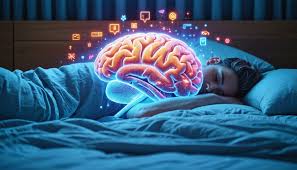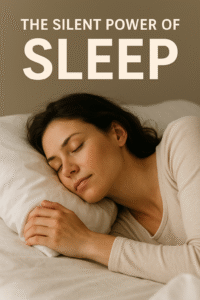
Munshif Ahamed

In today’s hectic world, sleep frequently seems like a luxury. We’ve learnt to view sleep as something optional; a few hours we may exchange for productivity because of pressing deadlines, flashing displays, late-night browsing, and never-ending obligations. But what if getting better sleep, rather than working more, is the true key to being more intelligent, healthier, and happier?
One of the most underappreciated cornerstones of health is sleep. We talk about nutrition and exercise all the time, but we never consider the basis for their efficacy. Your body cannot properly mend, grow, or even think clearly if you don’t get enough sleep, even if you eat the purest diet and exercise every day.
This article explains how sleep subtly affects every part of your health, including your immune system, brain, emotions, and metabolism, and why making sleep a priority might be the most effective lifestyle adjustment you can make.
The Science of Sleep
Your body changes gears rather than shutting down as you fall asleep. Light sleep, deep sleep, and REM (rapid eye movement) sleep are the three phases of sleep, which is an active biological activity. Every phase contributes differently to balance and healing.
Your body transitions from consciousness to slumber with the aid of light sleep.
Your muscles expand, your tissues heal, and your immune cells rejuvenate when you sleep deeply.
Your brain processes emotions, memories, and creativity during REM sleep.
An average adult goes through these phases around five times per night. Waking up too often or sleeping too little interferes with these phases, which affects everything from hormone production to mental concentration.
The Benefits of Sleep for the Brain
Perhaps the greatest advantage of getting enough sleep is for the brain. The brain eliminates metabolic waste during deep sleep, including beta-amyloid, a substance connected to Alzheimer’s disease. The glymphatic system, which is this “cleaning cycle,” operates about 10 times more efficiently when we are asleep.
Additionally, sleep is essential for memory consolidation. Your brain temporarily retains knowledge as you study, pick up new abilities, or take in information. This information is arranged and stored in long-term memory as you sleep. since of this, staying up late before a test frequently backfires since you recall less rather than more.
Your ability to think clearly is also diminished by sleep deprivation. Focus wanders, reaction speed diminishes, and decision-making becomes riskier. Studies reveal that 20 hours of sleep has an equal impact on performance as a blood alcohol content of 0.08%. To put it another way, sleep deprivation causes your brain to act like it’s somewhat intoxicated.
Sleep’s Emotional Aspect
It’s no accident that everything feels a little heavier when you’re exhausted. The brain region responsible for controlling emotions, the amygdala, is directly impacted by sleep. The amygdala becomes overactive when sleep deprivation occurs, magnifying stress, anger, or grief and making little irritations seem overwhelming.
Conversely, getting enough sleep improves the relationship between the prefrontal cortex, the brain’s logical, decision-making region, and the amygdala. Even under pressure, this emotional equilibrium keeps you composed, patient, and upbeat.
Anxiety, sadness, and burnout have been associated with chronic sleep deprivation. According to one study, persons who get less than six hours of sleep each night are more likely than those who get seven or eight hours to suffer from mental anguish.
The Overnight Repair System of the Body
Sleep quality affects not only your mental health but also your physical health. Your body goes into “repair mode” when you sleep. Deep sleep is when growth hormone, which is necessary for tissue repair, muscle recovery, and fat metabolism, peaks. For this reason, sleep is equally as important to athletes and fitness fanatics as exercise.
Sleep is also essential for your immune system. The body creates cytokines, which are proteins that combat inflammation and infection, when at rest. You become more vulnerable to colds, the flu, and longer recovery periods when you don’t get enough sleep.
Chronic conditions like diabetes and heart disease are also linked to sleep deprivation. Insulin sensitivity is impacted by sleep deprivation, which raises blood sugar levels and increases the risk of Type 2 diabetes. In the meanwhile, sleep disturbances raise cortisol, the stress hormone, and blood pressure, both of which eventually put stress on the heart.
The Metabolic Connection: Weight and Sleep
Sleep might be the missing component if you’ve ever attempted weight loss but reached an annoying plateau. Research indicates that the hormones ghrelin and leptin, which regulate appetite and fullness, are impacted by sleep loss. The hunger hormone ghrelin rises, and the satiety hormone leptin falls when you don’t get enough sleep, which makes you seek meals rich in calories.
Put another way, when you’re exhausted, your body physically fools you into eating more. This is biological, not merely a matter of willpower. Additionally, sleep deprivation lowers your drive to exercise and decreases your metabolism. Therefore, prolonged sleep loss might subtly undermine your progress even with a healthy diet.
The Modern Sleep Crisis and Technology
Ironically, one of the main causes of our inability to relax is the technology that makes our life simpler. The hormone that tells us it’s time to go to bed, melatonin, is suppressed by blue light from screens. Before going to bed, viewing movies or browsing social media overstimulates the brain, making it more difficult to relax.
Additionally, our neural systems are kept in a moderate level of awareness by the continuous connection, emails, texts, and notifications. Modern surroundings rarely offer the darkness and quiet that our brains were designed to slumber in. The brightness of a digital clock or the buzz of a phone charger may both gently disrupt sleep.
Turning off electronics an hour before bed, or creating a “digital sunset,” can significantly enhance the quality of your sleep. The brain may be signaled to take a break by substituting a book, journaling, or meditation for screens.
Developing Healthier Sleep Practices
Consistency is more important for improving sleep than perfection. Here are a few natural sleep-improving strategies supported by science:
You don’t have to change your routine all at once. Make tiny adjustments at first, such as going to bed 15 minutes earlier every night, then work your way up.
Longevity and Sleep
The relationship between sleep and longevity is perhaps the most startling truth concerning sleep. People who sleep seven to eight hours a night live longer and have reduced rates of chronic illness, according to several long-term research. Surprisingly, excessive sleep (more than 9–10 hours on a regular basis) might also indicate underlying health problems, whereas little sleep reduces longevity.
Nature’s reset button is sleep. Your body performs its most crucial maintenance tasks during this time, including hormone balance, cell regeneration, and mental clarity restoration. Ignoring it is similar to neglecting an automobile’s oil changes; systems may appear to be working properly for a time, but ultimately, they start to malfunction.
Concluding Remarks
Rest has turned into a rebellious act in a society that values activity. However, a well-rested body and mind are the first steps towards true success in terms of profession, happiness, and health. Sleep is the most effective way we can take care of ourselves; it is not a sign of sloth.
The next time you’re tempted to sacrifice sleep for an extra hour of work, keep in mind that your body repairs, your muscles rebuild, and your brain rewires during sleep. You’re investing in better hours in the future rather than wasting time.
Put your phone away, turn down the lights, and let sleep to work its silent magic tonight. Because sometimes closing your eyes is the best course of action.
Very interesting subject , thanks for posting.